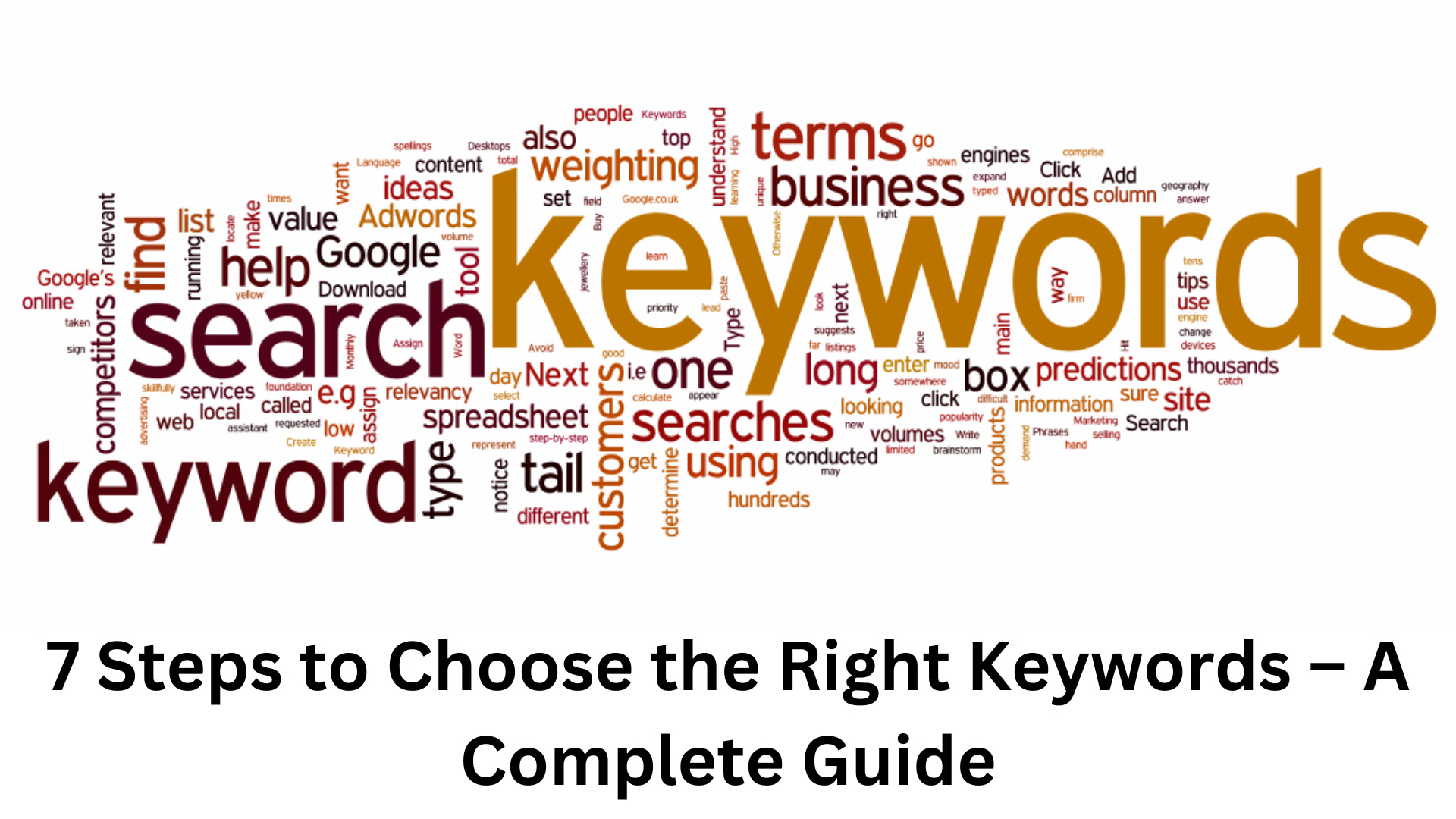Choosing the right keywords is one of the most important steps to achieve success in SEO. Choosing the right keywords helps your website rank higher and is an effective way to increase traffic to your website.
In today’s digital age when thousands of websites are offering the same type of products or services, choosing the right keywords can make your website stand out from the competitors. In this article, we will explain in detail 7 effective steps to choose the right keywords, so that you can increase the visibility of your website and rank on the first page of Google.
1. Understand your target audience in depth
Any SEO strategy starts with understanding the target audience. It is important to know what kind of questions your potential customers or users ask, what they are looking for, and what their problems are.
- Analyze the preferences and interests of the target audience.
- Find out which platforms they are most active on.
- Analyze online communities, forums, and social media to understand their needs.
Tools like Google Trends and Answer the Public can help you figure out what topics your audience is most interested in.
2. Analyze competitor websites and keywords in depth
It’s important to pay attention to the top competitor websites in your industry.
Learn what kind of keywords they are using and what keywords they rank for.
Tools like SEMrush, Ahrefs, and Ubersuggest can help you identify the keywords of direct competitors.
Make sure you also target keywords that fall into your competitors’ blind spots.
Studying competitors’ keywords will not only give you new opportunities but also help you figure out which keywords to focus on more.
3. Use powerful keyword research tools
It is extremely beneficial to use a variety of tools and resources for keyword research.
- Google Keyword Planner – Provides information on the search volume, difficulty, and estimated CPC of keywords.
- Ahrefs and Moz – Analyze competitors’ backlinks and ranking keywords.
- Answer the Public – Collects commonly asked questions that help find informational keywords.
Using these tools correctly, you can find keywords that not only have high search volume but also have low competition.
4. Divide keywords into different categories
Categorizing keywords makes the SEO strategy structured and effective.
Main categories:
1. Informational keywords – Used by the user to obtain information.
E.g.: “What is SEO?”, and “How to do keyword research?”
2. Navigational keywords – those used to reach a particular website or page.
E.g.: “cheap laptops on Amazon”, “Flipkart sale offers”
3. Transactional keywords – those that are likely to lead to a purchase or service booking.
E.g.: “buy best smartphones in 2024”, “buy cheap SEO tools”
This process makes it easier to target different types of users for your website.
5. Understand and apply search intent (User Intent)
The basic purpose of SEO is to identify user intent.
If the user is searching to find information, provide him with informational content.
If a user is ready to buy a product, build a transactional page.
Google search engine prefers pages that provide the exact solution as per the user’s need.
6. Importance of Long Tail Keywords
Long tail keywords are more precise than short keywords and give higher conversion rates.
For example:
“Best Free SEO Tools in 2024” instead of “SEO Tools“
“Online Digital Marketing Courses in Delhi” instead of “Marketing Courses”
With the help of long-tail keywords, you can target customers who are in the final stage of purchase.
7. Use keywords naturally and strategically
Excessive use of keywords (Keyword Stuffing) is seen as a negative signal by Google.
Include keywords naturally in titles, meta descriptions, headings, URLs, image ALT tags, and paragraphs.
Write high-quality, useful, and informative content that solves the problem of users.
Additional Tips:
Use keywords that users often ask in the FAQ section.
Highlight keywords in blog posts and articles.
Conclusion
Selecting the right keywords is the key to SEO success. By following the above 7 steps, you can increase your website ranking and get ahead of the competitors.
FAQ – Frequently asked questions about choosing the right keywords
1. What is keyword research and why is it important?
Answer: Keyword research is a process in which we find out what people are searching for about a topic, product, or service. It is the most important strategy of SEO because the right keywords help drive more traffic to your website and get higher rankings on Google.
2. Which tools are best for keyword research?
Answer: There are many effective tools available for keyword research, such as:
Google Keyword Planner
Ahrefs
SEMrush
Ubersuggest
Answer the Public
These tools provide information about the search volume, difficulty level, and trends of keywords.
3. What are long tail keywords and what is their importance?
Answer: Long tail keywords are keywords that are 3-4 words or more and target a very specific topic. Example:
“Digital Marketing Courses in Delhi 2024”
“Best Budget Smartphones 2024”
These keywords are low competition and provide high conversion rates.
4. Where and how to include keywords in content?
Ans: Include keywords naturally and strategically in the following places:
Title
Meta Description
Headings (H1, H2, H3 Tags)
URL
Image ALT text
In the first and last paragraph
Avoid excessive use of keywords as it may lead to keyword stuffing which can harm the ranking of the website.
5. What is keyword stuffing and how can it be avoided?
Ans: Keyword stuffing is the process in which excessive amounts of keywords are used, making the content look unnatural and spam-like. To avoid this:
Use keywords naturally.
Use synonyms and long tail variations.
Provide valuable and informative content to the user.
6. What is the best way to understand search intent?
Answer: Use the following methods to understand search intent:
Search related keywords on Google and analyze the top-ranking pages.
Study the questions asked by users on Answer the Public and Quora.
Look carefully at the Google Autocomplete and People Also Ask sections.
7. How many types of keywords are there for SEO?
Answer: There are mainly 3 types of keywords in SEO:
Informational Keywords: Users search to find information.
Navigational Keywords: Used to reach a particular website or page.
Transactional Keywords: Those whose purpose is to purchase a product or service.
8. Is it necessary to update keywords?
Answer: Yes, it is important to update keywords regularly as search trends and user behavior keep changing over time.
With the help of Google Trends, you can track the changing trends of keywords.
Update old blogs and pages with new information and content.
9. How can I find my competitors’ keywords?
Answer: You can use the following tools to find competitors’ keywords:
Ahrefs – Site Explorer
SEMrush – Domain Overview
Ubersuggest – Competitor Analysis
Just enter the competitor’s website URL and analyze their top-ranking keywords.
10. Is keyword research different for local SEO?
Answer: Yes, keyword research for local SEO is a little different. In local SEO, location is added to keywords.
Example:
“Digital Marketing Agency in Indore”
“Best Cafe in Delhi”
With local keywords, you can attract customers from a specific location and get better ranking in local search.












